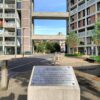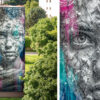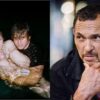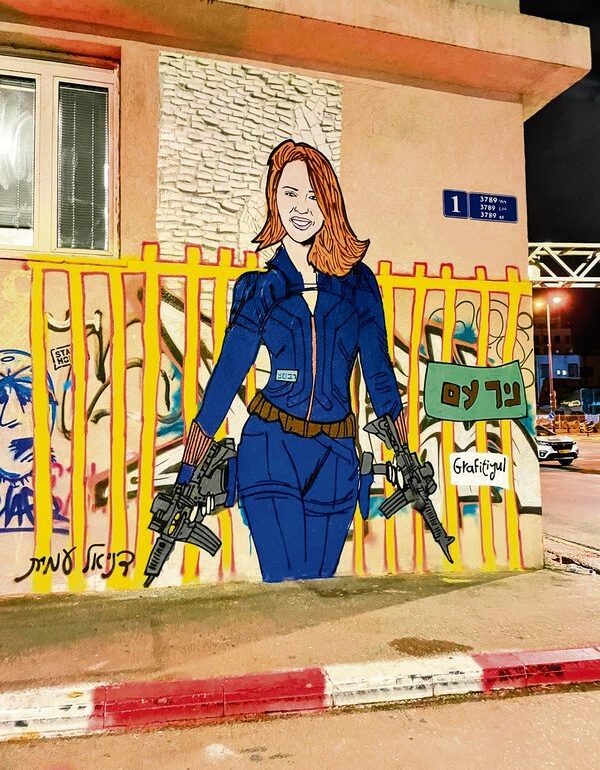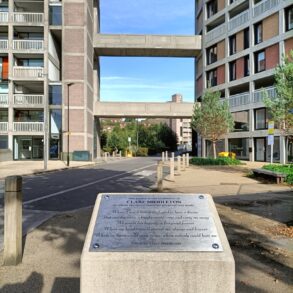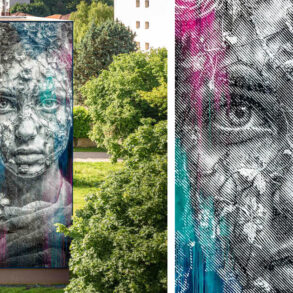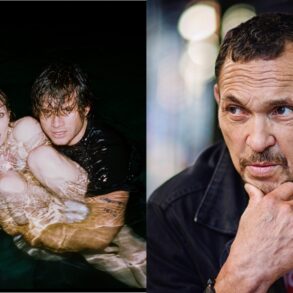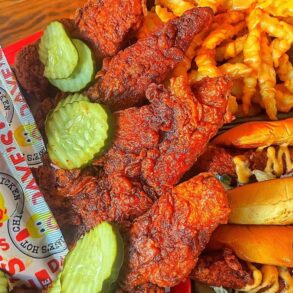While many people have taken to the written word to express themselves, artists throughout Israel have been taking to the streets – literally – to share their thoughts and feelings.
For Elinoy Kisslove, co-founder of Grafitiyul, the graffiti art that the group is producing is providing comfort and lifting the country up by painting the heroes and the good stories that have come out of October 7.
Elinoy explained that at first the group was very angry and their graffiti reflected this. But after a little while, someone suggested creating artwork that would lift the atmosphere. While she couldn’t think of anything optimistic at the time, her friend suggested painting Rachel Edry, the Ofakim resident who convinced five terrorists to come inside her house while waiting for a SWAT team to save her and her husband.
As documented on Times of Israel, during the 15 hours that they were inside her home, Rachel “served the terrorist treats, joked with them in rudimentary Arabic and even sang with them”.
This saved the couple’s life, and indeed many other lives around them.
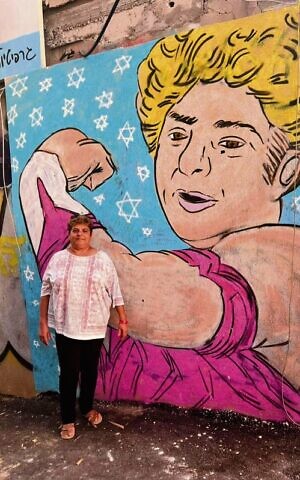
Rachel Edry. Photo: Instagram @grafitiyul
“We painted her as a superhero,” Elinoy explained over WhatsApp from Israel. “That was amazing because it was the first time we saw people leaving their house, walking out in the street and seeing what we did. And they smiled. It was such a good moment. Even Rachel came to see the graffiti and take a picture with it.
“Since that moment, we decided to dedicate and find heroes in all the hard things that happened in Israel.”
Morgane, who goes by Yiddish Feminist on Instagram, shared a similar sentiment. Explaining that it took a month to get over the initial shock, she felt both numb and overwhelmed.
“Then numbness gave way to a deep anger at the world for its reactions. The lies, the denials, the way antisemitic theories made such an exponential comeback, the hatred thrown at both Israelis and Diaspora Jews,” she said. “My first paste-ups talked about this anger, about the betrayal of so-called feminists and even more hurtful, of who we thought were our friends and allies.”
The paste-ups Morgane is referring to are her therapeutic street art installations. Morgane takes phrases that she writes and pastes them in various spots around Tel Aviv. Phrases such as “if your feminism doesn’t include Jews it isn’t feminism” and “our wounds are centuries old but so are our resilience and our strength”. While she said she initially did the paste-ups for her own sanity, the public reaction was heartwarming.
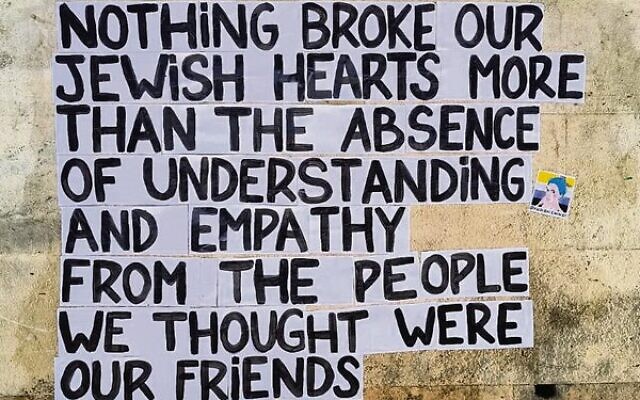
Photo: Instagram @yiddishfeminist
“The act of painting the words, which can be quite a lengthy process, and to physically walk around Tel Aviv until I find a spot that speaks to me, is very cathartic and at first, it was purely selfish of me, I was doing it for my own sanity,” she recalled. “Then the reception that my messages found within our community made me realise that my words could help heal not only myself but others, and it became so much more. I receive as much as I give if not more, we help and support each other and that’s a beautiful thing.”
“What I love today is how loud and proud most Jews have become. It’s liberating in a way, how we are collectively done with the role that was forced upon us, and I am convinced that this sense of confidence and pride has come with having a country, even for Jews living in Diaspora.” Morgane, @yiddishfeminist
Morgane was born and raised in France, moving to Israel in 2009. Coming from a family of Holocaust survivors, she always knew that activism would be part of her life. She said she writes mainly in English to show Diaspora Jews that people in Israel are supporting them just as much as Diaspora Jews support Israelis, particularly when it comes to antisemitism. Morgane said it’s particularly important “to address this modern form of Jew-hate and how it is affecting our communities everywhere, underlying an experience that was felt by many as individual, but was in fact a collective one”. Her dream is to take her paste-ups global to be loud and proud with Jewish pride all around the world.
Elinoy explained that since Grafitiyul first started painting the portraits around Tel Aviv, others have not only sent through requests about who to paint but have also joined in.
One request was to paint Inbal Rabin-Liberman, who, as the head of security of Kibbutz Nir Am, alongside her 12-member security team, managed to save the lives of all the kibbutz members despite taking heavy fire from Hamas terrorists.

From left: the Bibas family, Oz Davidan and Rimon Kirsht Buchshtav
The group also painted Oz Davidan.
“He rescued 140 people from the Nova party with his car. He did it for 25 hours,” Elinoy said, explaining that there were only three pictures of him and very little information about what he did. “After we painted him, it was so emotional. He found us; he started crying.”
Elinoy explained that even his family didn’t know what he had done, with his daughter finding out because of the graffiti painting. “She didn’t know what he did, because he didn’t tell anyone.”
Another poignant reminder of the strength of those affected by October 7 is the artwork of Rimon Kirsht Buchshtav, who was released from captivity as part of the initial round of hostage negotiation deals. Rimon was hailed a hero when she famously stood up to her captors, refusing to smile at them and instead giving them one final piercing stare of defiance and walking away with her arm around a fellow hostage. Grafitiyul has also painted a portrait of the Bibas family, shared on Instagram during Chanukah with the caption “praying for a miracle”.
Elinoy said she hopes her graffiti, albeit illegal, serves as a reminder that there are good things in the world.
“Some people think graffiti is vandalism or ugly, and I want to show that it’s not. It’s so much more than that,” she said. “It’s actually trying to do good in the world or to make a change. So, I hope to open people’s eyes and for them to find places in their life that they can impact other people.”
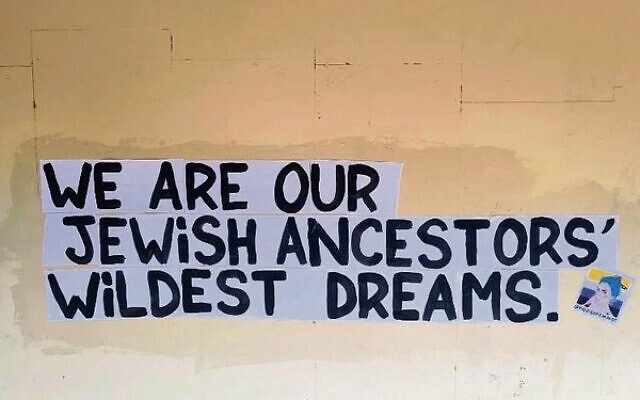
Photo: Instagram @yiddishfeminist
Morgane said she delights in seeing how proud Jews are becoming post-October 7 and hopes her artwork helps people see their value in the world.
“For centuries in the Diaspora, Jews have been made to feel small, to play nice or to feel grateful for being tolerated when that was the case, like a favour was being done to us. What I love today is how loud and proud most Jews have become. It’s liberating in a way, how we are collectively done with the role that was forced upon us, and I am convinced that this sense of confidence and pride has come with having a country, even for Jews living in Diaspora. There is a sense of revenge indeed, like this pride in our identity will not be taken down ever again. We are not a disposable side piece in another country’s history anymore,” she eloquently expressed.
“Then there is the importance of Jewish joy and tikkun olam, which are our best tools to combat hatred. Those are the elements of Judaism that always held the highest value and gave me the most pride in being Jewish. The fact that Jewish joy is a mitzvah, that our resilience was hard earned but is stronger than ever … the very fact that we are still here today is a statistical improbability that makes me believe that we exist for a reason.
“For such a tiny population, that has faced centuries of hate and prejudice, we not only survive but thrive and we brought so much to the world. These values give me the hope that we will manage to find our way towards peace one day. Tikkun olam – repairing the world, making it a better place than we found it, not only for ourselves but for everyone, is embedded in our identity.”
Follow @grafitiyul and @yiddishfeminist on Instagram
This post was originally published on this site be sure to check out more of their content.

